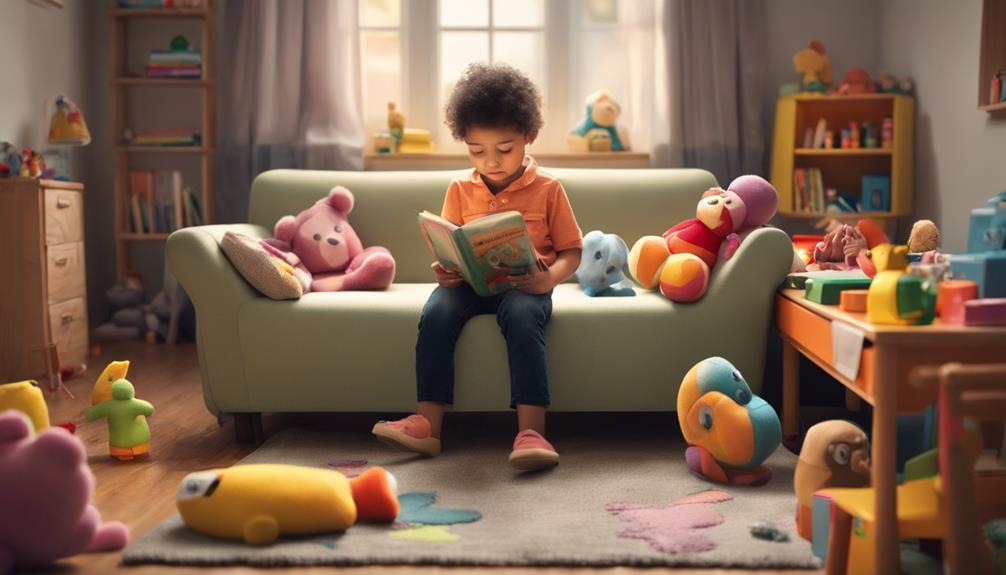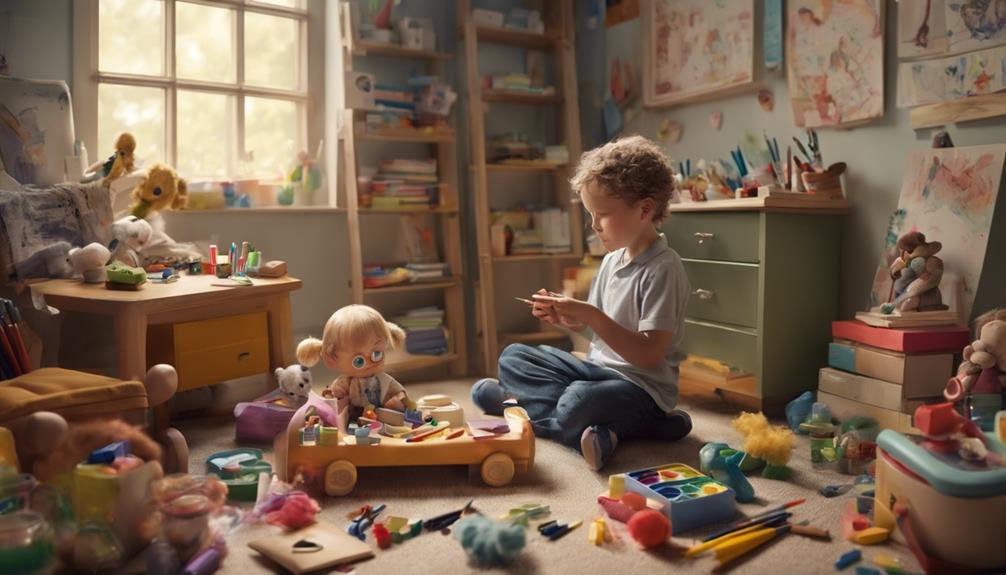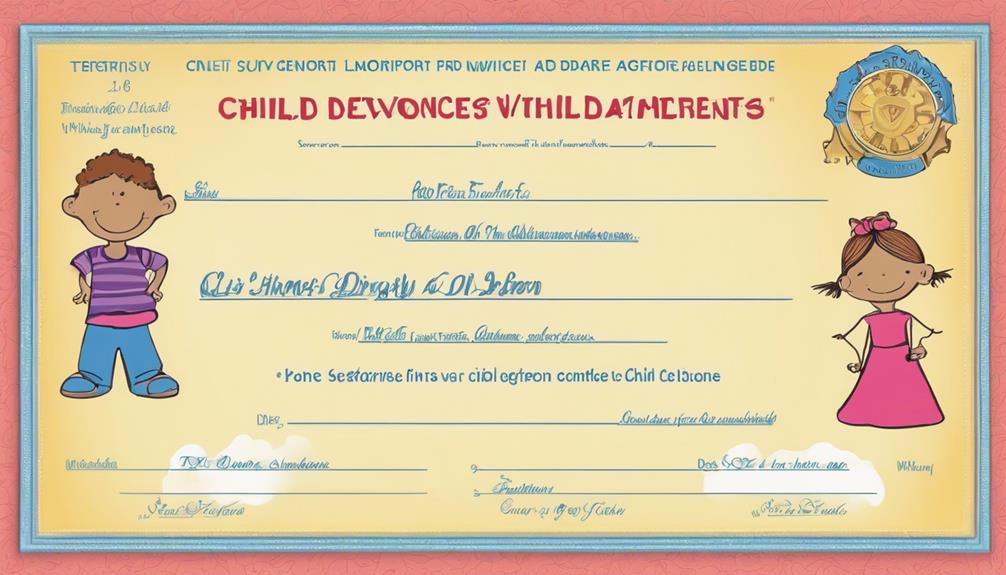Are you saying that children are expected to navigate the emotional challenges of divorce by themselves? We all know that’s not true.
Therapy steps in as a crucial support system, but what exactly does it entail? How can therapists help children cope with the complexities of divorce in a healthy way?
Let's explore the intricate role of therapy in supporting children through this challenging time and how it can make a significant difference in their emotional well-being and resilience.
Key Takeaways
- Therapy offers crucial emotional support for children during divorce.
- Counseling equips children with coping skills and resilience.
- Therapists help children navigate changes in family dynamics post-divorce.
- Therapy guides children in processing emotions and developing effective coping strategies.
Therapy as a Support System
Therapy serves as a vital support system for children experiencing the challenges of divorce, providing a safe space for them to express their emotions and develop effective coping strategies. During this tumultuous time, children may feel overwhelmed by the changes happening within their family dynamic. Therapy offers a comforting environment where they can freely communicate their fears and uncertainties.
Parents going through a divorce often worry about the impact it has on their children. Therapy plays a crucial role in helping children navigate these complex emotions. By working with skilled therapists who utilize evidence-based approaches like Cognitive Behavioral Therapy (CBT), children can learn how to manage their anxiety and stress related to the divorce. Through therapy, children can gradually understand and modify their thoughts, fostering a positive adjustment to the new family structure.
In therapy, children receive guidance on building resilience for the future. They learn valuable coping strategies that empower them to face the challenges of divorce with strength and adaptability. The support system provided by therapy equips children with the tools they need to navigate this difficult period and emerge stronger emotionally.
Understanding Children's Emotional Needs

Navigating the emotional needs of children during divorce is a critical aspect that demands understanding and support. Children whose parents are going through a divorce often experience a range of emotions such as anxiety, sadness, and confusion. It is crucial to provide emotional support to these children to prevent long-term negative impacts on their well-being. Therapy plays a vital role in helping children process their feelings, develop coping strategies, and navigate the challenges they face during the divorce process.
| Emotional Needs of Children During Divorce | ||
|---|---|---|
| Anxiety | Sadness | Confusion |
| Feeling worried, | Experiencing feelings of | Struggling to understand |
| fearful, or stressed | sadness and grief | what is happening |
Understanding and validating children's emotional responses is essential in helping them cope with the changes in their family dynamic. Through therapy, children of divorce have a safe space to express their emotions, fears, and concerns, ultimately aiding in their emotional well-being.
Building Resilience Through Counseling
To help children navigate the challenges of divorce and foster emotional strength, counseling offers a supportive environment for them to express their feelings and fears. Divorce therapy plays a crucial role in building resilience in children by providing a safe space where they can process their emotions and develop coping skills. Through therapy, children can learn to understand and modify their thoughts, reducing anxiety and facilitating positive adjustment to changes in family dynamics.
Here are three key ways counseling helps children build resilience:
- Creating a Safe Space: Counseling offers a secure environment where children can freely express their emotions and fears without judgment, fostering emotional healing and growth.
- Developing Coping Skills: Therapy equips children with tools to manage divorce-related stress, teaching them healthy ways to cope with their emotions and navigate challenging situations.
- Promoting Positive Adjustment: By addressing anxiety and emotional struggles, counseling supports children in adapting to the new family structure, helping them thrive despite the changes.
Navigating Changes in Family Dynamics

During times of significant change like divorce, children often find themselves adjusting to new family dynamics that can be challenging yet transformative. In the United States, many children face emotional challenges as they navigate the shifting landscape of their family structures post-divorce.
Therapy plays a crucial role in supporting children through this process by providing a safe and understanding environment where they can express their feelings and fears. Therapists help children comprehend and cope with the changes in routines and relationships that result from divorce, aiding them in developing effective coping strategies.
Role of Therapist in Children's Healing
In supporting children through the healing process post-divorce, therapists play a vital role in providing a safe and empathetic space for children to express their emotions and navigate the complexities of their changing family dynamics.
Therapists assist children in coping with divorce-related stress and emotions using evidence-based techniques, such as Cognitive Behavioral Therapy. They advocate for children by coaching parents, contributing to a smoother transition to the new family dynamics.
Therapists offer perspective, reassurance, and interpretive aid, guiding children towards understanding and acceptance of the divorce situation. By creating a united front with family members, therapists help children cope with the challenges of marriage and family separation and divorce proceedings.
Through education programs tailored to the specific needs of children in different counties in the United States, therapists play a crucial role in supporting the mental health and well-being of children during this difficult time.
Frequently Asked Questions
How Does Therapy Help Children of Divorce?
Therapy helps children of divorce by offering a safe place to voice feelings and fears. It guides kids to understand and manage their thoughts, reducing anxiety. We support them in coping with divorce stress, fostering emotional healing and stability.
What Are the Goals of Children of Divorce Therapy?
In children of divorce therapy, our main goals are helping kids cope with emotional distress, providing a safe space for them to express feelings, fears, and concerns, and assisting in understanding and processing emotions to adjust positively.
Why Is Therapy Important After Divorce?
Therapy after divorce is crucial for children as it helps them cope with emotional challenges like anxiety, aggression, and self-blame. It provides a safe space to express feelings, fears, and concerns, promoting positive adjustment and well-being.
What Is Most Important in Helping Children Cope With Divorce?
In helping children cope with divorce, acknowledging their feelings, reassuring love, maintaining routines, creating stability, and establishing family rituals are crucial. Open communication, active listening, and continuous support play pivotal roles in their well-being.
How Does Christian Counseling for Children of Divorce Compare to Traditional Therapy?
Christian counseling for children provides a unique approach to addressing the emotional and spiritual needs of kids dealing with divorce. Unlike traditional therapy, Christian counseling integrates faith-based principles and values into the healing process, offering a different perspective and support system for children navigating the complexities of divorce.
Conclusion
As we walk alongside children through the stormy seas of divorce, therapy acts as a guiding lighthouse, illuminating their path to emotional healing and resilience.
Like seeds planted in the fertile soil of support, children can grow strong roots of coping strategies and bloom into resilient flowers, adapting and thriving in the ever-changing garden of family dynamics.
Remember, with therapy as their compass, children can navigate the turbulent waters of divorce with courage and hope.










